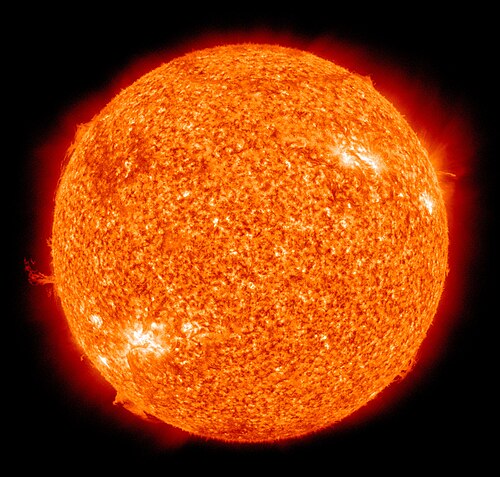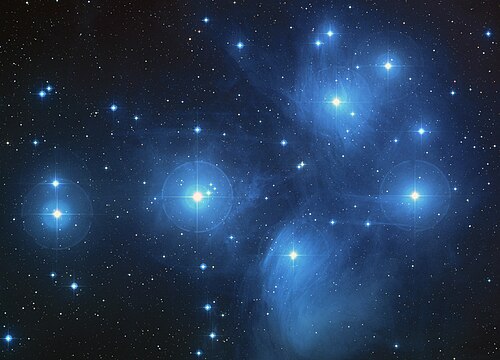Starnoun
Any small luminous dot appearing in the cloudless portion of the night sky, especially with a fixed location relative to other such dots.
Starnoun
(star) A luminous celestial body, made up of plasma (particularly hydrogen and helium) and having a spherical shape. Depending on context the sun may or may not be included.
Starnoun
(geometry) A concave polygon with regular, pointy protrusions and indentations, generally with five or six points.
Starnoun
(acting) An actor in a leading role.
Starnoun
An exceptionally talented or famous person, often in a specific field; a celebrity.
Starnoun
(printing) An asterisk (*).
Starnoun
A symbol used to rate hotels, films, etc. with a higher number of stars denoting better quality.
Starnoun
A simple dance, or part of a dance, where a group of four dancers each put their right or left hand in the middle and turn around in a circle. You call them right-hand stars or left-hand stars, depending on the hand which is in the middle.
Starnoun
(astrology) A planet supposed to influence one's destiny.
Starnoun
A star-shaped ornament worn on the breast to indicate rank or honour.
Starnoun
A composition of combustible matter used in the heading of rockets, in mines, etc., which, exploding in the air, presents a starlike appearance.
Starverb
(intransitive) To appear as a featured performer or headliner, especially in an entertainment program.
Starverb
(transitive) To feature a performer or a headliner, especially in a movie or an entertainment program.
Starverb
(transitive) To mark with a star or asterisk.
Starverb
(transitive) To set or adorn with stars, or bright, radiating bodies; to bespangle.
Starnoun
One of the innumerable luminous bodies seen in the heavens; any heavenly body other than the sun, moon, comets, and nebulæ.
Starnoun
The polestar; the north star.
Starnoun
A planet supposed to influence one's destiny; (usually pl.) a configuration of the planets, supposed to influence fortune.
Starnoun
That which resembles the figure of a star, as an ornament worn on the breast to indicate rank or honor.
Starnoun
Specifically, a radiated mark in writing or printing; an asterisk [thus, *]; - used as a reference to a note, or to fill a blank where something is omitted, etc.
Starnoun
A composition of combustible matter used in the heading of rockets, in mines, etc., which, exploding in the air, presents a starlike appearance.
Starnoun
A person of brilliant and attractive qualities, especially on public occasions, as a distinguished orator, a leading theatrical performer, etc.
Starverb
To set or adorn with stars, or bright, radiating bodies; to bespangle; as, a robe starred with gems.
Starverb
To be bright, or attract attention, as a star; to shine like a star; to be brilliant or prominent; to play a part as a theatrical star.
Starnoun
(astronomy) a celestial body of hot gases that radiates energy derived from thermonuclear reactions in the interior
Starnoun
someone who is dazzlingly skilled in any field
Starnoun
any celestial body visible (as a point of light) from the Earth at night
Starnoun
a plane figure with 5 or more points; often used as an emblem
Starnoun
an actor who plays a principal role
Starnoun
a performer who receives prominent billing
Starnoun
a star-shaped character * used in printing
Starnoun
the topology of a network whose components are connected to a hub
Starverb
feature as the star;
Starverb
be the star in a performance
Starverb
mark with an asterisk;
Staradjective
indicating the most important performer or role;
Star
A star is an astronomical object consisting of a luminous spheroid of plasma held together by its own gravity. The nearest star to Earth is the Sun.
Nebulanoun
(astronomy) A cloud in outer space consisting of gas or dust (e.g. a cloud formed after a star explodes).
Nebulanoun
A white spot or slight opacity of the cornea.
Nebulanoun
A cloudy appearance in the urine
Nebulanoun
A faint, cloudlike, self-luminous mass of matter situated beyond the solar system among the stars. The term was originally applied to any diffuse luminous region. Now, technically, it is applied to interstellar clouds of dust and gases (diffuse nebula). However distant galaxies and very distant star clusters often appear like them in the telescope, such as the spiral nebula in Andromeda, known now to be a distant galaxy.
Nebulanoun
A white spot or a slight opacity of the cornea.
Nebulanoun
a medicinal liquid preparation intended for use in an atomizer
Nebulanoun
cloudiness of the urine
Nebulanoun
an immense cloud of gas (mainly hydrogen) and dust in interstellar space
Nebulanoun
(pathology) a faint cloudy spot on the cornea
Nebulanoun
a cloud of gas and dust in outer space, visible in the night sky either as an indistinct bright patch or as a dark silhouette against other luminous matter.
Nebulanoun
a galaxy.
Nebulanoun
a clouded spot on the cornea causing defective vision.
Nebula
A nebula (Latin for 'cloud' or 'fog'; pl. nebulae, nebulæ or nebulas) is an interstellar cloud of dust, hydrogen, helium and other ionized gases.




















